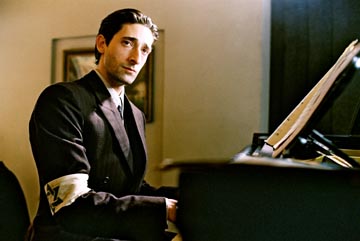“The West has given more significance to the myth of the genocide of the Jews, even more significant than God, religion, and the prophets.” In the world-gets-even-scarier-department, Iran’s hardliner president publicly indulges in Holocaust denial. Clearly, Iran is living up to its axis-of-evil appellation these days, but remember: Ahmadinejad’s election was in part blowback from Dubya’s amateurish and tone-deaf Middle-East policy in the first place. At any rate, it’s clear that our Iran situation is worsening, and that Iranian possession of nukes could be a very frightening scenario.
Tag: Holocaust
Schindler’s Liszt.
 Caught Roman Polanski’s The Pianist Wednesday night and quite liked it, although as you might expect it’s pretty grueling – I’m not sure if I’d watch it again anytime soon. The first half plays out as a well-done and unflinching (non-Spielbergized) look at life and death in the Warsaw ghetto. (Watching Adrien Brody step over the bodies of starved children on his way to work, I was briefly reminded again of how unbelievably unrealistic and offensive I found Roberto Benigni’s Life is Beautiful.) As powerful as this first hour is, though, it can’t help but follow some of the conventions we’ve come to expect from films in the Holocaust genre – the Szpilmans keep saying things like, “Well at least we know this is as bad as it’s going to get,” while the audience knows full well it’s about to get much much worse. So, despite the unspeakable horrors on screen and the often-riveting performances throughout, we keep waiting for the other shoe to drop.
Caught Roman Polanski’s The Pianist Wednesday night and quite liked it, although as you might expect it’s pretty grueling – I’m not sure if I’d watch it again anytime soon. The first half plays out as a well-done and unflinching (non-Spielbergized) look at life and death in the Warsaw ghetto. (Watching Adrien Brody step over the bodies of starved children on his way to work, I was briefly reminded again of how unbelievably unrealistic and offensive I found Roberto Benigni’s Life is Beautiful.) As powerful as this first hour is, though, it can’t help but follow some of the conventions we’ve come to expect from films in the Holocaust genre – the Szpilmans keep saying things like, “Well at least we know this is as bad as it’s going to get,” while the audience knows full well it’s about to get much much worse. So, despite the unspeakable horrors on screen and the often-riveting performances throughout, we keep waiting for the other shoe to drop.
 The second half, however, is a different story. When through a combination of luck and timely aid Szpilman finally manages to escape the ghetto, the film enters (at least to me) novel territory and becomes a strangely riveting and unfamiliar survival story, wherein a deteriorating Adrien Brody, moving from apartment to apartment and constantly scrounging for food and warmth, tries to wait out the end of the conflict. This part of The Pianist moves at a strange, languid pace and feels very unfilmlike, until a twist at the end that, although it may be true, still brings us back onto the well-trod path of filmic convention.
The second half, however, is a different story. When through a combination of luck and timely aid Szpilman finally manages to escape the ghetto, the film enters (at least to me) novel territory and becomes a strangely riveting and unfamiliar survival story, wherein a deteriorating Adrien Brody, moving from apartment to apartment and constantly scrounging for food and warmth, tries to wait out the end of the conflict. This part of The Pianist moves at a strange, languid pace and feels very unfilmlike, until a twist at the end that, although it may be true, still brings us back onto the well-trod path of filmic convention.
I doubt The Pianist will win any major Oscars, not only so the Academy can dodge the Polanski child molester bullet but also because Adrien Brody, who is undoubtedly excellent, plays Szpilman so maddeningly remote. We spend a lot of time with Brody in this film, and never once do we get the sense that we know what’s going on in his head, which I suppose is part of the point. At any rate, I can’t see the Academy rewarding this kind of understatement over a scenery-chewing performance like that of Daniel Day-Lewis, who carries Gangs of New York over at the other acting extreme. Nevertheless, The Pianist is a film worth seeing, if you have the stamina for it.
